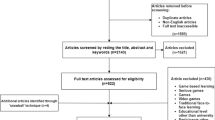Abstract
The gamification of e-portfolio is an educational approach to motivate students to learn by using game elements in online portfolios. The goal is to increase enjoyment and engagement through capturing the interest of learners and encouraging them to continue learning. This preliminary survey is important to better understand the intended users in a Malaysian institution, find out their readiness, and identify the infrastructure and facilities currently in place. The work in progress investigates students’ demographics information, students’ current styles in organizing their learning material, their prior experience with portfolio creation and development, their prior experience in using game applications and their current knowledge of ‘gamification’. The outcome of this survey shows that there are currently acceptable levels of current infrastructure and facilities provided at the institution with a satisfactory knowledge of portfolios and game elements. However, there is an interesting misconception of what ‘gamification’ is from the student’s perspectives.
Access this chapter
Tax calculation will be finalised at checkout
Purchases are for personal use only
Similar content being viewed by others
References
Bakar, A., Inal, Y., Cagiltay, K.: Use of commercial games for educational purposes: will today’s teacher candidates use them in the future? In: World Conference on Educational Multimedia, Hypermedia and Telecommunications 2006, pp. 1757–1762 (2006)
Connolly, T.M., Boyle, E., MacArthur, E., Hainey, T., Boyle, J.M.: A systematic literature review of empirical evidence on computer games and serious games. Comput. Educ. 59, 661–686 (2012)
Kim, B., Park, H., Baek, Y.: Not just fun, but serious strategies: using meta-cognitive strategies in game-based learning. Comput. Educ. 52, 800–810 (2009)
Silva, E.: Gamifying learning – Enzo Silva blog. Enzosilva.com (2016). http://enzosilva.com/blog/2010/10/14/gamifying-learning/. Accessed 1 July 2016
Simões, J., Redondo, R.D., Vilas, A.F.: A social gamification framework for a K-6 learning platform. Comput. Hum. Behav. 29, 345–353 (2013)
Domínguez, A., Saenz-de-Navarrete, J., De-Marcos, L., Fernández-Sanz, L., Pagés, C., Martínez-Herráiz, J.-J.: Gamifying learning experiences: practical implications and outcomes. Comput. Educ. 63, 380–392 (2013)
Deterding, S., Sicart, M., Nacke, L., O’Hara, K., Dixon, D.: Gamification: using game-design elements in non-gaming contexts. In: Proceedings of the 2011 Annual Conference Extended Abstracts on Human Factors in Computing Systems - CHI EA 2011, p. 2425 (2011)
Muntean, C.: Raising engagement in e-learning through gamification. In: Proceedings of 6th International Conference on Virtual Learning ICVL (2011)
ITU: Measuring the information society report (2014). http://www.itu.int/en/ITU-D/Statistics/Documents/publications/mis2014/MIS2014_without_Annex_4.pdf, http://www.itu.int/ITUD/ict/statistics/Gender/index.html
Lucas, K., Sherry, J.L.: Sex differences in video game play: a communication-based explanation. Commun. Res. 31, 499–523 (2004)
Graner Ray, S.: Gender Inclusive game design: expanding the market, p. 350 (2003)
Author information
Authors and Affiliations
Corresponding author
Editor information
Editors and Affiliations
Rights and permissions
Copyright information
© 2017 ICST Institute for Computer Sciences, Social Informatics and Telecommunications Engineering
About this paper
Cite this paper
Abdul Wahab, M., Joy, M. (2017). Raising Engagement and Motivation Through Gamified e-Portfolio in Kolej Profesional MARA (KPM), Malaysia: A Preliminary Survey. In: Vincenti, G., Bucciero, A., Helfert, M., Glowatz, M. (eds) E-Learning, E-Education, and Online Training. Lecture Notes of the Institute for Computer Sciences, Social Informatics and Telecommunications Engineering, vol 180. Springer, Cham. https://doi.org/10.1007/978-3-319-49625-2_11
Download citation
DOI: https://doi.org/10.1007/978-3-319-49625-2_11
Published:
Publisher Name: Springer, Cham
Print ISBN: 978-3-319-49624-5
Online ISBN: 978-3-319-49625-2
eBook Packages: Computer ScienceComputer Science (R0)




